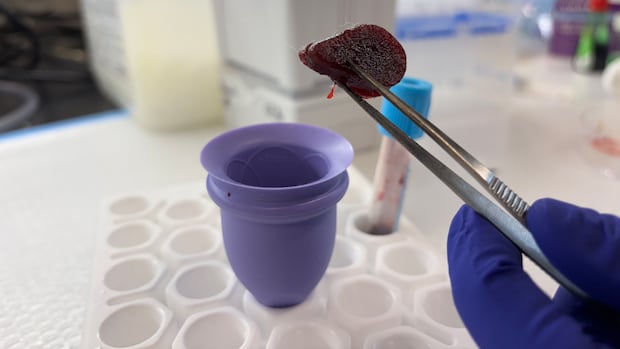Science
McMaster Innovates Menstrual Health with New Absorbent Tablets

Research conducted at McMaster University has led to the development of absorbent tablets designed to enhance the functionality of menstrual cups, addressing common concerns associated with their use. According to professor Zeinab Hosseinidoust from the university’s department of chemical engineering, innovation in menstrual products has been lacking despite the significant number of individuals who menstruate globally.
Professor Hosseinidoust, alongside associate professor Tohid Didar, has created these smart tablets to reduce the mess often associated with menstrual cups, which have gained popularity for being eco-friendly and cost-effective. “This is a field ripe for innovation. There is so much that can be done,” said Hosseinidoust, highlighting the unmet needs within menstrual health.
The World Health Organization estimates that over two billion people menstruate worldwide, with significant numbers facing challenges related to period poverty. In Canada, for instance, one in six menstruators has experienced such difficulties. Federal government research indicates that the average individual spends approximately $6,000 on menstrual products over their lifetime. Moreover, one in four Canadians perceives menstruation as “dirty.”
The new absorbent tablets are made from seaweed-based materials, making them biodegradable and flushable. This feature addresses environmental concerns while maintaining cost-effectiveness. Hosseinidoust pointed out that many individuals express worries about the mess associated with menstrual cups, indicating a gap in product usability. “It was just a matter of opening the doors and looking at the problem,” she stated, noting the historical neglect in addressing menstrual health issues.
Several students at McMaster University have responded positively to the innovation. Dior David, a student, remarked that while she does not find the process messy, the introduction of such tablets would significantly enhance convenience, especially in public restrooms. “It would honestly just make everything more convenient,” she explained, emphasizing how the tablets could streamline the experience of using menstrual products.
Another student, Jennifer Abraham, expressed enthusiasm about the ongoing research in the menstrual product industry. “It’s important that we have more products and more education about it, so that way people can choose an option that works best for them,” she said. Abraham believes that advancements like these are crucial for promoting dialogue around menstruation and reducing stigma.
The absorbent tablets serve a dual purpose: while they are designed for single use, they also hold the potential for infection detection. Research indicates that they could help identify conditions like urinary tract infections and bacterial vaginosis, leveraging bacteriophages—viruses that selectively target harmful bacteria without affecting beneficial ones. Hosseinidoust is actively exploring the integration of these bacteriophages with menstrual products to enhance their functionality further.
As a researcher, Hosseinidoust views the pursuit of innovation in menstrual products as discovering a significant gap in the market. “Finding such a big gap in work towards innovation in menstrual products was like discovering a gold mine,” she said. Yet, she also reflects on the broader societal attitudes toward menstruation, questioning why such basic needs have long been overlooked.
The ongoing research at McMaster University not only aims to refine menstrual products but also seeks to empower individuals by diminishing the stigma surrounding menstruation. By addressing practical concerns and enhancing product usability, this initiative represents a step forward in menstrual health innovation.
-

 Education3 months ago
Education3 months agoBrandon University’s Failed $5 Million Project Sparks Oversight Review
-

 Science4 months ago
Science4 months agoMicrosoft Confirms U.S. Law Overrules Canadian Data Sovereignty
-

 Lifestyle3 months ago
Lifestyle3 months agoWinnipeg Celebrates Culinary Creativity During Le Burger Week 2025
-

 Health4 months ago
Health4 months agoMontreal’s Groupe Marcelle Leads Canadian Cosmetic Industry Growth
-

 Technology3 months ago
Technology3 months agoDragon Ball: Sparking! Zero Launching on Switch and Switch 2 This November
-

 Science4 months ago
Science4 months agoTech Innovator Amandipp Singh Transforms Hiring for Disabled
-

 Education3 months ago
Education3 months agoRed River College Launches New Programs to Address Industry Needs
-

 Technology4 months ago
Technology4 months agoGoogle Pixel 10 Pro Fold Specs Unveiled Ahead of Launch
-

 Business3 months ago
Business3 months agoRocket Lab Reports Strong Q2 2025 Revenue Growth and Future Plans
-

 Technology2 months ago
Technology2 months agoDiscord Faces Serious Security Breach Affecting Millions
-

 Education3 months ago
Education3 months agoAlberta Teachers’ Strike: Potential Impacts on Students and Families
-

 Science3 months ago
Science3 months agoChina’s Wukong Spacesuit Sets New Standard for AI in Space
-

 Education3 months ago
Education3 months agoNew SĆIȺNEW̱ SṮEȽIṮḴEȽ Elementary Opens in Langford for 2025/2026 Year
-

 Business4 months ago
Business4 months agoNew Estimates Reveal ChatGPT-5 Energy Use Could Soar
-

 Technology4 months ago
Technology4 months agoWorld of Warcraft Players Buzz Over 19-Quest Bee Challenge
-

 Business3 months ago
Business3 months agoDawson City Residents Rally Around Buy Canadian Movement
-

 Technology2 months ago
Technology2 months agoHuawei MatePad 12X Redefines Tablet Experience for Professionals
-

 Business3 months ago
Business3 months agoBNA Brewing to Open New Bowling Alley in Downtown Penticton
-

 Technology4 months ago
Technology4 months agoFuture Entertainment Launches DDoD with Gameplay Trailer Showcase
-

 Technology4 months ago
Technology4 months agoGlobal Launch of Ragnarok M: Classic Set for September 3, 2025
-

 Technology4 months ago
Technology4 months agoInnovative 140W GaN Travel Adapter Combines Power and Convenience
-

 Science4 months ago
Science4 months agoXi Labs Innovates with New AI Operating System Set for 2025 Launch
-

 Top Stories2 months ago
Top Stories2 months agoBlue Jays Shift José Berríos to Bullpen Ahead of Playoffs
-

 Technology4 months ago
Technology4 months agoNew IDR01 Smart Ring Offers Advanced Sports Tracking for $169










